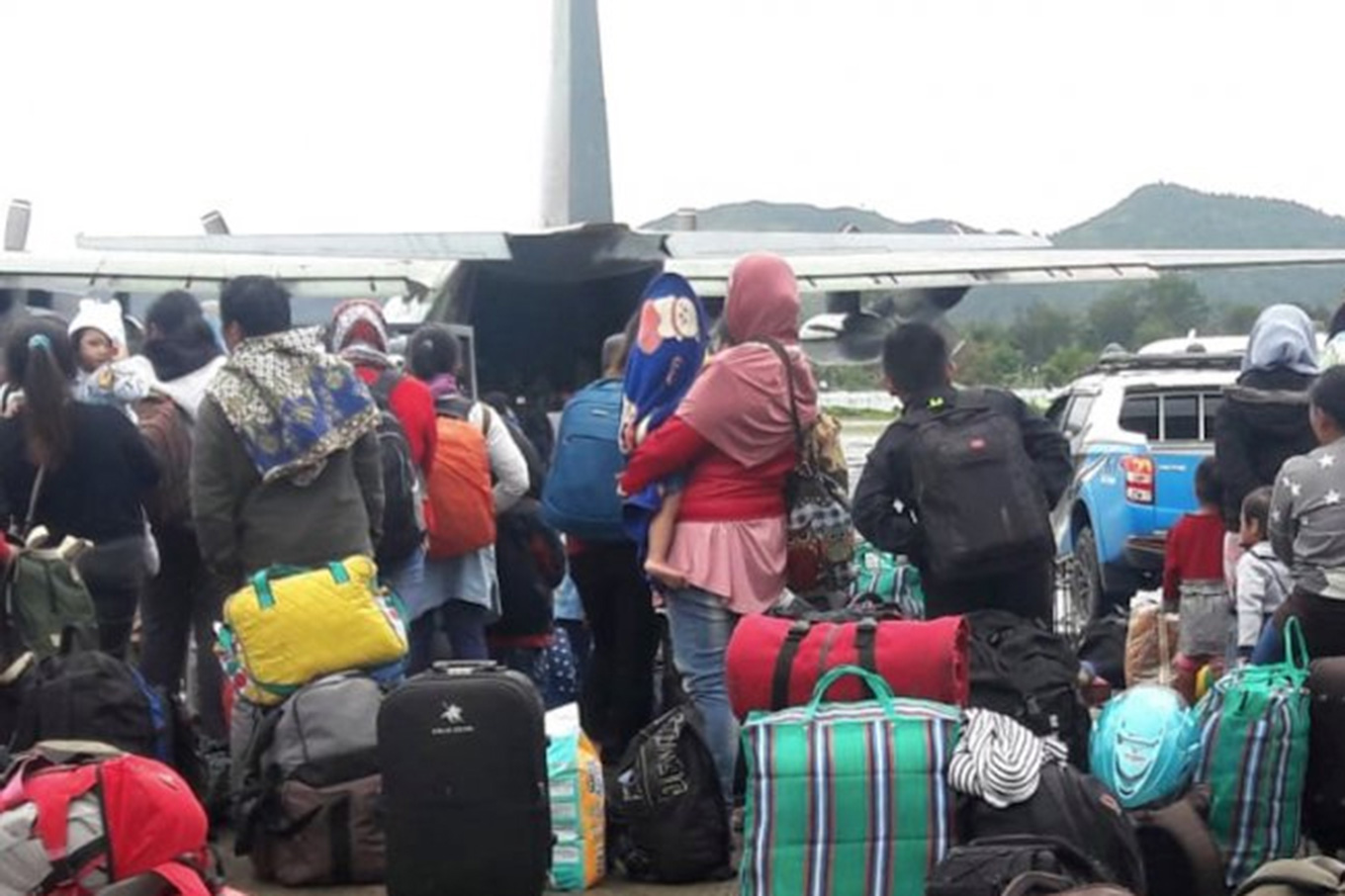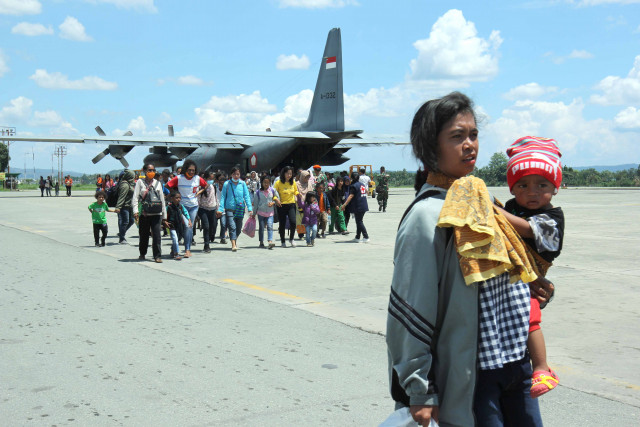Popular Reads
Top Results
Can't find what you're looking for?
View all search resultsPopular Reads
Top Results
Can't find what you're looking for?
View all search resultsGood neighbors: Papuans help non-natives flee violence in Wamena
“We have lived together and helped each other. So, it's prohibited to kill each other under any circumstances,” Nico said. He said he did what the culture of Yali Huwula dictated.
Change text size
Gift Premium Articles
to Anyone
A
s thousands of non-native residents are trying to flee from Wamena in Papua’s Jayawijaya regency following deadly rioting, some heartwarming stories have emerged about native residents of the province protecting non-native residents during the chaos.
"All those who say native Papuans are heartless, look at this photo! This was taken in front of my house," a Twitter user named Edenia tweeted. The picture, which later went viral, shows three Papuans escorting a non-Papuan family. The non-Papuan man is seen hugging a Papuan man. "These are the same people that helped my mother before the security forces arrived. Without them, she might have been dead now,” Edenia said. The posts have been retweeted more than 9,000 times.
teruntuk kalian yang mengatakan orang papua itu kejam. lihat foto ini.
ini diambil di depan rumah saya. orang2 ini yg juga menyelamatkan ibu saya sebelum aparat datang. kalau tidak ada mereka, mungkin ibu saya sudah tidak ada. pic.twitter.com/5L7tCLZxQC
— edenia | KLIK LINK DI BIO UNTUK DONASI KE WAMENA (@deawawolumaya) September 29, 2019
Other residents have similar stories to tell about native inhabitants of Wamena helping people of non-Papuan descent flee from the site of the riots in Phike on Sept. 23 when a mob was setting alight building and other public facilities.
Papuan Obet Mabel, together with a number of other native residents of the city, helped at least 58 families reach a safe place in the city center. They blocked the way of the rioters who were chasing after the fleeing residents. “I led [the rescue effort],” Obet said, adding that the faces of the rioters were unfamiliar to him.
“I don’t know where they come from,” he told The Jakarta Post on Sunday.
Obet said he and his friends had to fight off the attackers when he and his friends hid the non-native Papuans in their houses. Later, they gathered the non-Papuans and escorted them to the city center, where security forces were on guard. "[The non-Papuans] were in the middle and we [the Papuans] walked on either side [to protect them]," Obet went on.
"We were worried, because when we came near the spring, we saw a group of people carrying a Papuan who had been hit by a bullet. They saw us escorting [non-Papuans]. We were in a difficult situation, between a rock and a hard place. But we carried on escorting them to the city center," he said.
When the native Papuans came back to their neighborhood, they saw some people looting the kiosks and shops of the non-Papuans. Obet and friends argued with the looters. "We work hard guarding the shops. Until today, the shops are safe, we're guarding them," he added.
Another native resident, elementary school teacher Nico Logo, said he had hidden non-native Papuans in his house until the situation was safe enough. He further said it could not possibly have been native Papuans from the neighborhood who attacked or even murdered those from outside Papua, because they had lived together in peace and harmony for a long time.
“We have lived together and helped each other. So, it's prohibited to kill each other under any circumstances,” Nico said. He said he did what the culture of Yali Huwula dictated.
The locals were currently protecting the properties of the displaced residents, as some individuals tried to ransack their houses.
Ami, another Wamena resident who witnessed the riots in the Hom-Hom area, said the mob seemed to be targeting non-native Papuans, as the majority of people living in Hom-Hom and having properties there came from outside the province.
However, he did not recognize the rioters’ faces. “They might come from other districts or from the mountains.”
At least 33 people have been killed in the Wamena riots--most of them people of non-Papuan descent. Authorities said the victims had died of stab wounds or burns.
The riots reportedly followed a high school student protest triggered by a rumor about a racist slur by a non-native teacher against a Papuan student at senior high school SMA PGRI in Wamena days earlier. The offended students are believed to have assembled with other Papuans to stage a rally that eventually turned violent. Police later claimed the rumor was fake news.
Whether that protest is connected to the riots remains unclear, as residents said they had witnessed people from outside Wamena among the rioters.
Some 2,670 residents have fled the affected area, and thousands more are ready to leave amid fear of further violence.
Another resident, who requested anonymity for security reason, told the Post on Tuesday, a day after the riot, that non-Papuans residing in the Sinakma neighborhood had worked together to secure the neighborhood on Sept. 23 when the protest turned violent. About 10-15 men were guarding the streets of the neighborhood, about half of them non-Papuans.
His neighborhood was about 1.5 kilometer from fire-ravaged regent's office, he said.
On Tuesday, he said, the non-Papuans were staying at home while the Papuans guarded the street to the neighborhood. However, he saw some security personnel picking up some non-Papuans, and this made him wonder why the security forces seemed to protect only the non-Papuans, since some older Papuans felt unsafe as well. Some of them fled to the kampung on Tuesday, he said.
"Why are they protecting only non-Papuans? Who are our enemies?" he told the Post on Sept. 24.











